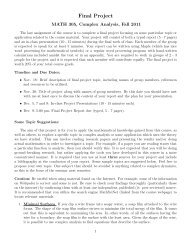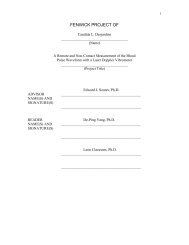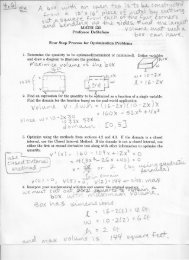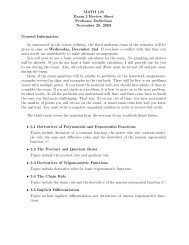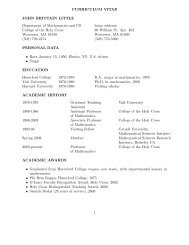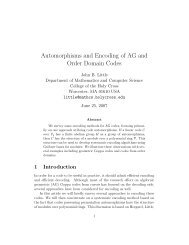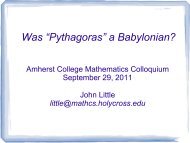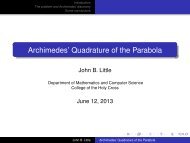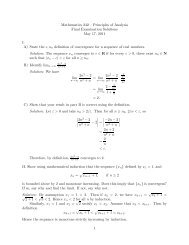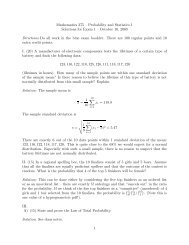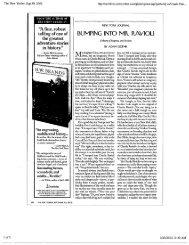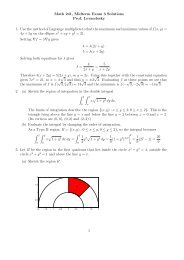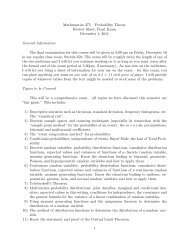- Page 1: Calculus for Mathematicians, Comput
- Page 4 and 5: ii CONTENTS 5.3 Continuous Function
- Page 6 and 7: iv CONTENTS
- Page 8 and 9: vi LIST OF FIGURES 3.11 A piecewise
- Page 10 and 11: viii LIST OF FIGURES
- Page 12 and 13: x PREFACE trustworthy tells you wha
- Page 14 and 15: xii PREFACE
- Page 16 and 17: 2 CHAPTER 1. THE LANGUAGE OF MATHEM
- Page 20 and 21: 6 CHAPTER 1. THE LANGUAGE OF MATHEM
- Page 22 and 23: 8 CHAPTER 1. THE LANGUAGE OF MATHEM
- Page 24 and 25: 10 CHAPTER 1. THE LANGUAGE OF MATHE
- Page 26 and 27: 12 CHAPTER 1. THE LANGUAGE OF MATHE
- Page 28 and 29: 14 CHAPTER 1. THE LANGUAGE OF MATHE
- Page 30 and 31: 16 CHAPTER 1. THE LANGUAGE OF MATHE
- Page 32 and 33: 18 CHAPTER 1. THE LANGUAGE OF MATHE
- Page 34 and 35: 20 CHAPTER 1. THE LANGUAGE OF MATHE
- Page 36 and 37: 22 CHAPTER 1. THE LANGUAGE OF MATHE
- Page 38 and 39: 24 CHAPTER 1. THE LANGUAGE OF MATHE
- Page 40 and 41: 26 CHAPTER 1. THE LANGUAGE OF MATHE
- Page 42 and 43: 28 CHAPTER 1. THE LANGUAGE OF MATHE
- Page 44 and 45: 30 CHAPTER 1. THE LANGUAGE OF MATHE
- Page 46 and 47: 32 CHAPTER 1. THE LANGUAGE OF MATHE
- Page 48 and 49: 34 CHAPTER 2. NUMBERS definitively
- Page 50 and 51: 36 CHAPTER 2. NUMBERS Proof. (Sketc
- Page 52 and 53: 38 CHAPTER 2. NUMBERS a sequence of
- Page 54 and 55: 40 CHAPTER 2. NUMBERS Assume A is n
- Page 56 and 57: 42 CHAPTER 2. NUMBERS because the e
- Page 58 and 59: 44 CHAPTER 2. NUMBERS complete thei
- Page 60 and 61: 46 CHAPTER 2. NUMBERS Note that the
- Page 62 and 63: 48 CHAPTER 2. NUMBERS • (Reflexiv
- Page 64 and 65: 50 CHAPTER 2. NUMBERS It remains to
- Page 66 and 67: 52 CHAPTER 2. NUMBERS A.4 (Commutat
- Page 68 and 69:
54 CHAPTER 2. NUMBERS set 1Z is a
- Page 70 and 71:
56 CHAPTER 2. NUMBERS and using the
- Page 72 and 73:
58 CHAPTER 2. NUMBERS is called a g
- Page 74 and 75:
60 CHAPTER 2. NUMBERS Proof. Suppos
- Page 76 and 77:
62 CHAPTER 2. NUMBERS Roughly, taki
- Page 78 and 79:
64 CHAPTER 2. NUMBERS Suprema Which
- Page 80 and 81:
66 CHAPTER 2. NUMBERS • A has a m
- Page 82 and 83:
68 CHAPTER 2. NUMBERS • X is boun
- Page 84 and 85:
70 CHAPTER 2. NUMBERS The reason fo
- Page 86 and 87:
72 CHAPTER 2. NUMBERS - For every x
- Page 88 and 89:
74 CHAPTER 2. NUMBERS one can prove
- Page 90 and 91:
76 CHAPTER 2. NUMBERS Before calcul
- Page 92 and 93:
78 CHAPTER 2. NUMBERS an open inter
- Page 94 and 95:
80 CHAPTER 2. NUMBERS With a bit of
- Page 96 and 97:
82 CHAPTER 2. NUMBERS Exercise 2.2
- Page 98 and 99:
84 CHAPTER 2. NUMBERS (b) x2 − 1
- Page 100 and 101:
86 CHAPTER 2. NUMBERS Then prove yo
- Page 102 and 103:
88 CHAPTER 2. NUMBERS (d) Consider
- Page 104 and 105:
90 CHAPTER 2. NUMBERS (b) Show that
- Page 106 and 107:
92 CHAPTER 2. NUMBERS non-terminati
- Page 108 and 109:
94 CHAPTER 2. NUMBERS with ak integ
- Page 110 and 111:
96 CHAPTER 2. NUMBERS
- Page 112 and 113:
98 CHAPTER 3. FUNCTIONS “potentia
- Page 114 and 115:
100 CHAPTER 3. FUNCTIONS f(t0) f(t1
- Page 116 and 117:
102 CHAPTER 3. FUNCTIONS The Vertic
- Page 118 and 119:
104 CHAPTER 3. FUNCTIONS 3.3 y = x
- Page 120 and 121:
106 CHAPTER 3. FUNCTIONS Y X × Y N
- Page 122 and 123:
108 CHAPTER 3. FUNCTIONS |x| = √
- Page 124 and 125:
110 CHAPTER 3. FUNCTIONS If we pick
- Page 126 and 127:
112 CHAPTER 3. FUNCTIONS see Figure
- Page 128 and 129:
114 CHAPTER 3. FUNCTIONS is the lar
- Page 130 and 131:
116 CHAPTER 3. FUNCTIONS This is th
- Page 132 and 133:
118 CHAPTER 3. FUNCTIONS Every rati
- Page 134 and 135:
120 CHAPTER 3. FUNCTIONS infinite o
- Page 136 and 137:
122 CHAPTER 3. FUNCTIONS To convey
- Page 138 and 139:
124 CHAPTER 3. FUNCTIONS you run er
- Page 140 and 141:
126 CHAPTER 3. FUNCTIONS solve for
- Page 142 and 143:
128 CHAPTER 3. FUNCTIONS to the set
- Page 144 and 145:
130 CHAPTER 3. FUNCTIONS The situat
- Page 146 and 147:
132 CHAPTER 3. FUNCTIONS customary
- Page 148 and 149:
134 CHAPTER 3. FUNCTIONS There is a
- Page 150 and 151:
136 CHAPTER 3. FUNCTIONS By inducti
- Page 152 and 153:
138 CHAPTER 3. FUNCTIONS (a) For k
- Page 154 and 155:
140 CHAPTER 3. FUNCTIONS Exercise 3
- Page 156 and 157:
142 CHAPTER 3. FUNCTIONS Exercise 3
- Page 158 and 159:
144 CHAPTER 4. LIMITS AND CONTINUIT
- Page 160 and 161:
146 CHAPTER 4. LIMITS AND CONTINUIT
- Page 162 and 163:
148 CHAPTER 4. LIMITS AND CONTINUIT
- Page 164 and 165:
150 CHAPTER 4. LIMITS AND CONTINUIT
- Page 166 and 167:
152 CHAPTER 4. LIMITS AND CONTINUIT
- Page 168 and 169:
154 CHAPTER 4. LIMITS AND CONTINUIT
- Page 170 and 171:
156 CHAPTER 4. LIMITS AND CONTINUIT
- Page 172 and 173:
158 CHAPTER 4. LIMITS AND CONTINUIT
- Page 174 and 175:
160 CHAPTER 4. LIMITS AND CONTINUIT
- Page 176 and 177:
162 CHAPTER 4. LIMITS AND CONTINUIT
- Page 178 and 179:
164 CHAPTER 4. LIMITS AND CONTINUIT
- Page 180 and 181:
166 CHAPTER 4. LIMITS AND CONTINUIT
- Page 182 and 183:
168 CHAPTER 4. LIMITS AND CONTINUIT
- Page 184 and 185:
170 CHAPTER 4. LIMITS AND CONTINUIT
- Page 186 and 187:
172 CHAPTER 4. LIMITS AND CONTINUIT
- Page 188 and 189:
174 CHAPTER 4. LIMITS AND CONTINUIT
- Page 190 and 191:
176 CHAPTER 4. LIMITS AND CONTINUIT
- Page 192 and 193:
178 CHAPTER 4. LIMITS AND CONTINUIT
- Page 194 and 195:
180 CHAPTER 4. LIMITS AND CONTINUIT
- Page 196 and 197:
182 CHAPTER 4. LIMITS AND CONTINUIT
- Page 198 and 199:
184 CHAPTER 4. LIMITS AND CONTINUIT
- Page 200 and 201:
186 CHAPTER 4. LIMITS AND CONTINUIT
- Page 202 and 203:
188 CHAPTER 4. LIMITS AND CONTINUIT
- Page 204 and 205:
190 CHAPTER 4. LIMITS AND CONTINUIT
- Page 206 and 207:
192 CHAPTER 4. LIMITS AND CONTINUIT
- Page 208 and 209:
194 CHAPTER 4. LIMITS AND CONTINUIT
- Page 210 and 211:
196 CHAPTER 4. LIMITS AND CONTINUIT
- Page 212 and 213:
198 CHAPTER 4. LIMITS AND CONTINUIT
- Page 214 and 215:
200 CHAPTER 4. LIMITS AND CONTINUIT
- Page 216 and 217:
202 CHAPTER 4. LIMITS AND CONTINUIT
- Page 218 and 219:
204 CHAPTER 5. CONTINUITY ON INTERV
- Page 220 and 221:
206 CHAPTER 5. CONTINUITY ON INTERV
- Page 222 and 223:
208 CHAPTER 5. CONTINUITY ON INTERV
- Page 224 and 225:
210 CHAPTER 5. CONTINUITY ON INTERV
- Page 226 and 227:
212 CHAPTER 5. CONTINUITY ON INTERV
- Page 228 and 229:
214 CHAPTER 5. CONTINUITY ON INTERV
- Page 230 and 231:
216 CHAPTER 5. CONTINUITY ON INTERV
- Page 232 and 233:
218 CHAPTER 5. CONTINUITY ON INTERV
- Page 234 and 235:
220 CHAPTER 5. CONTINUITY ON INTERV
- Page 236 and 237:
222 CHAPTER 5. CONTINUITY ON INTERV
- Page 238 and 239:
224 CHAPTER 6. WHAT IS CALCULUS? Su
- Page 240 and 241:
226 CHAPTER 6. WHAT IS CALCULUS? 6.
- Page 242 and 243:
228 CHAPTER 6. WHAT IS CALCULUS? wh
- Page 244 and 245:
230 CHAPTER 7. INTEGRATION y = f(x)
- Page 246 and 247:
232 CHAPTER 7. INTEGRATION each sub
- Page 248 and 249:
234 CHAPTER 7. INTEGRATION reduces
- Page 250 and 251:
236 CHAPTER 7. INTEGRATION the expr
- Page 252 and 253:
238 CHAPTER 7. INTEGRATION regardle
- Page 254 and 255:
240 CHAPTER 7. INTEGRATION 7.3 Abst
- Page 256 and 257:
242 CHAPTER 7. INTEGRATION By Propo
- Page 258 and 259:
244 CHAPTER 7. INTEGRATION the lowe
- Page 260 and 261:
246 CHAPTER 7. INTEGRATION strange;
- Page 262 and 263:
248 CHAPTER 7. INTEGRATION Taking t
- Page 264 and 265:
250 CHAPTER 7. INTEGRATION 7.5 Impr
- Page 266 and 267:
252 CHAPTER 7. INTEGRATION 0 k k +
- Page 268 and 269:
254 CHAPTER 7. INTEGRATION Exercise
- Page 270 and 271:
256 CHAPTER 7. INTEGRATION Hint: Co
- Page 272 and 273:
258 CHAPTER 7. INTEGRATION Exercise
- Page 274 and 275:
260 CHAPTER 7. INTEGRATION
- Page 276 and 277:
262 CHAPTER 8. DIFFERENTIATION The
- Page 278 and 279:
264 CHAPTER 8. DIFFERENTIATION zero
- Page 280 and 281:
266 CHAPTER 8. DIFFERENTIATION The
- Page 282 and 283:
268 CHAPTER 8. DIFFERENTIATION For
- Page 284 and 285:
270 CHAPTER 8. DIFFERENTIATION Prop
- Page 286 and 287:
272 CHAPTER 8. DIFFERENTIATION Theo
- Page 288 and 289:
274 CHAPTER 8. DIFFERENTIATION Supp
- Page 290 and 291:
276 CHAPTER 8. DIFFERENTIATION Opti
- Page 292 and 293:
278 CHAPTER 8. DIFFERENTIATION Chap
- Page 294 and 295:
280 CHAPTER 8. DIFFERENTIATION Poly
- Page 296 and 297:
282 CHAPTER 8. DIFFERENTIATION (c)
- Page 298 and 299:
284 CHAPTER 8. DIFFERENTIATION
- Page 300 and 301:
286 CHAPTER 9. THE MEAN VALUE THEOR
- Page 302 and 303:
288 CHAPTER 9. THE MEAN VALUE THEOR
- Page 304 and 305:
290 CHAPTER 9. THE MEAN VALUE THEOR
- Page 306 and 307:
292 CHAPTER 9. THE MEAN VALUE THEOR
- Page 308 and 309:
294 CHAPTER 9. THE MEAN VALUE THEOR
- Page 310 and 311:
296 CHAPTER 9. THE MEAN VALUE THEOR
- Page 312 and 313:
298 CHAPTER 9. THE MEAN VALUE THEOR
- Page 314 and 315:
300 CHAPTER 9. THE MEAN VALUE THEOR
- Page 316 and 317:
302 CHAPTER 9. THE MEAN VALUE THEOR
- Page 318 and 319:
304 CHAPTER 9. THE MEAN VALUE THEOR
- Page 320 and 321:
306 CHAPTER 9. THE MEAN VALUE THEOR
- Page 322 and 323:
308 CHAPTER 9. THE MEAN VALUE THEOR
- Page 324 and 325:
310 CHAPTER 9. THE MEAN VALUE THEOR
- Page 326 and 327:
312 CHAPTER 10. THE FUNDAMENTAL THE
- Page 328 and 329:
314 CHAPTER 10. THE FUNDAMENTAL THE
- Page 330 and 331:
316 CHAPTER 10. THE FUNDAMENTAL THE
- Page 332 and 333:
318 CHAPTER 10. THE FUNDAMENTAL THE
- Page 334 and 335:
320 CHAPTER 10. THE FUNDAMENTAL THE
- Page 336 and 337:
322 CHAPTER 10. THE FUNDAMENTAL THE
- Page 338 and 339:
324 CHAPTER 10. THE FUNDAMENTAL THE
- Page 340 and 341:
326 CHAPTER 11. SEQUENCES OF FUNCTI
- Page 342 and 343:
328 CHAPTER 11. SEQUENCES OF FUNCTI
- Page 344 and 345:
330 CHAPTER 11. SEQUENCES OF FUNCTI
- Page 346 and 347:
332 CHAPTER 11. SEQUENCES OF FUNCTI
- Page 348 and 349:
334 CHAPTER 11. SEQUENCES OF FUNCTI
- Page 350 and 351:
336 CHAPTER 11. SEQUENCES OF FUNCTI
- Page 352 and 353:
338 CHAPTER 11. SEQUENCES OF FUNCTI
- Page 354 and 355:
340 CHAPTER 11. SEQUENCES OF FUNCTI
- Page 356 and 357:
342 CHAPTER 11. SEQUENCES OF FUNCTI
- Page 358 and 359:
344 CHAPTER 11. SEQUENCES OF FUNCTI
- Page 360 and 361:
346 CHAPTER 11. SEQUENCES OF FUNCTI
- Page 362 and 363:
348 CHAPTER 11. SEQUENCES OF FUNCTI
- Page 364 and 365:
350 CHAPTER 11. SEQUENCES OF FUNCTI
- Page 366 and 367:
352 CHAPTER 11. SEQUENCES OF FUNCTI
- Page 368 and 369:
354 CHAPTER 11. SEQUENCES OF FUNCTI
- Page 370 and 371:
356 CHAPTER 11. SEQUENCES OF FUNCTI
- Page 372 and 373:
358 CHAPTER 11. SEQUENCES OF FUNCTI
- Page 374 and 375:
360 CHAPTER 12. LOG AND EXP 12.1 Th
- Page 376 and 377:
362 CHAPTER 12. LOG AND EXP log x 1
- Page 378 and 379:
364 CHAPTER 12. LOG AND EXP differe
- Page 380 and 381:
366 CHAPTER 12. LOG AND EXP Two Rep
- Page 382 and 383:
368 CHAPTER 12. LOG AND EXP 1 2 3 4
- Page 384 and 385:
370 CHAPTER 12. LOG AND EXP Exercis
- Page 386 and 387:
372 CHAPTER 12. LOG AND EXP (d) How
- Page 388 and 389:
374 CHAPTER 13. THE TRIGONOMETRIC F
- Page 390 and 391:
376 CHAPTER 13. THE TRIGONOMETRIC F
- Page 392 and 393:
378 CHAPTER 13. THE TRIGONOMETRIC F
- Page 394 and 395:
380 CHAPTER 13. THE TRIGONOMETRIC F
- Page 396 and 397:
382 CHAPTER 13. THE TRIGONOMETRIC F
- Page 398 and 399:
384 CHAPTER 13. THE TRIGONOMETRIC F
- Page 400 and 401:
386 CHAPTER 13. THE TRIGONOMETRIC F
- Page 402 and 403:
388 CHAPTER 13. THE TRIGONOMETRIC F
- Page 404 and 405:
390 CHAPTER 13. THE TRIGONOMETRIC F
- Page 406 and 407:
392 CHAPTER 13. THE TRIGONOMETRIC F
- Page 408 and 409:
394 CHAPTER 13. THE TRIGONOMETRIC F
- Page 410 and 411:
396 CHAPTER 13. THE TRIGONOMETRIC F
- Page 412 and 413:
398 CHAPTER 14. TAYLOR APPROXIMATIO
- Page 414 and 415:
400 CHAPTER 14. TAYLOR APPROXIMATIO
- Page 416 and 417:
402 CHAPTER 14. TAYLOR APPROXIMATIO
- Page 418 and 419:
404 CHAPTER 14. TAYLOR APPROXIMATIO
- Page 420 and 421:
406 CHAPTER 14. TAYLOR APPROXIMATIO
- Page 422 and 423:
408 CHAPTER 14. TAYLOR APPROXIMATIO
- Page 424 and 425:
410 CHAPTER 14. TAYLOR APPROXIMATIO
- Page 426 and 427:
412 CHAPTER 14. TAYLOR APPROXIMATIO
- Page 428 and 429:
414 CHAPTER 14. TAYLOR APPROXIMATIO
- Page 430 and 431:
416 CHAPTER 14. TAYLOR APPROXIMATIO
- Page 432 and 433:
418 CHAPTER 14. TAYLOR APPROXIMATIO
- Page 434 and 435:
420 CHAPTER 15. ELEMENTARY FUNCTION
- Page 436 and 437:
422 CHAPTER 15. ELEMENTARY FUNCTION
- Page 438 and 439:
424 CHAPTER 15. ELEMENTARY FUNCTION
- Page 440 and 441:
426 CHAPTER 15. ELEMENTARY FUNCTION
- Page 442 and 443:
428 CHAPTER 15. ELEMENTARY FUNCTION
- Page 444 and 445:
430 CHAPTER 15. ELEMENTARY FUNCTION
- Page 446 and 447:
432 CHAPTER 15. ELEMENTARY FUNCTION
- Page 448 and 449:
434 CHAPTER 15. ELEMENTARY FUNCTION
- Page 450 and 451:
436 CHAPTER 15. ELEMENTARY FUNCTION
- Page 452 and 453:
438 CHAPTER 15. ELEMENTARY FUNCTION
- Page 454 and 455:
440 CHAPTER 15. ELEMENTARY FUNCTION
- Page 456 and 457:
442 CHAPTER 15. ELEMENTARY FUNCTION
- Page 458 and 459:
444 CHAPTER 15. ELEMENTARY FUNCTION
- Page 460 and 461:
446 CHAPTER 15. ELEMENTARY FUNCTION
- Page 462 and 463:
448 CHAPTER 15. ELEMENTARY FUNCTION
- Page 464 and 465:
450 CHAPTER 15. ELEMENTARY FUNCTION
- Page 466 and 467:
452 CHAPTER 15. ELEMENTARY FUNCTION
- Page 468 and 469:
454 CHAPTER 15. ELEMENTARY FUNCTION
- Page 470 and 471:
456 CHAPTER 15. ELEMENTARY FUNCTION
- Page 472 and 473:
458 APPENDIX progress on a question
- Page 474 and 475:
460 APPENDIX ingredient labelling o
- Page 476 and 477:
462 APPENDIX . POSTSCRIPT
- Page 478 and 479:
464 BIBLIOGRAPHY
- Page 480 and 481:
466 INDEX of singleton, 253 Charlie
- Page 482 and 483:
468 INDEX and integral of power fun
- Page 484 and 485:
470 INDEX Natural logarithm functio
- Page 486 and 487:
472 INDEX no limit at zero, 159 Sim



